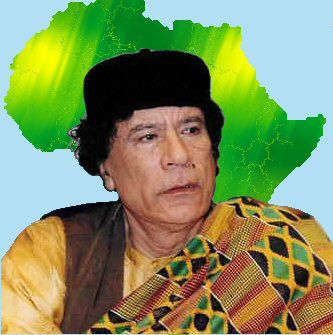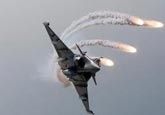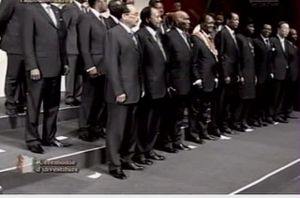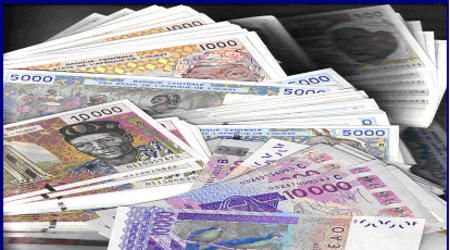journalist threatened By Allies Do Not GO AGAINST NATO PROPAGANDA OR BE KILLED
Le silence et l’inaction est la plus grande arme de destruction massive
Silence and inaction is the deadliest weapon of mass destruction.
Afrohistorama Communication
Qui sont les BARBARES ? ( UN DOCUMENT TRES RARE)
Le silence et l’inaction est la plus grande arme de destruction massive
Silence and inaction is the deadliest weapon of mass destruction.
Afrohistorama Communication
ot To Be Shown on CNN, CBS, ABC, NBC or FOX - NATO's Crimes in Libya
Le silence et l’inaction est la plus grande arme de destruction massive
Silence and inaction is the deadliest weapon of mass destruction.
Afrohistorama Communication
Libye – Bienvenue en Jamahiriya, votre… cimetière !
 TRIPOLI – Le vieux leader de
la Jamahiriya, Mouammar Kadhafi, le seul et vrai représentant légitime du peuple libyen, est debout. Et ceci, malgré le forcing des massacreurs de
l’OTAN qui
ont trituré les résolutions onusiennes (1970
et 1973) et leurs affidés à « reconnaître » les « bouchers de Benghazi », dit avoir parcouru, hier, les rues de Tripoli, incognito. Dans son discours, il a affirmé:
« Je suis vivant et sain, et je ne vais pas quitter la Libye. Ne faites pas confiance aux rapports mensongers des chaînes occidentales. »
TRIPOLI – Le vieux leader de
la Jamahiriya, Mouammar Kadhafi, le seul et vrai représentant légitime du peuple libyen, est debout. Et ceci, malgré le forcing des massacreurs de
l’OTAN qui
ont trituré les résolutions onusiennes (1970
et 1973) et leurs affidés à « reconnaître » les « bouchers de Benghazi », dit avoir parcouru, hier, les rues de Tripoli, incognito. Dans son discours, il a affirmé:
« Je suis vivant et sain, et je ne vais pas quitter la Libye. Ne faites pas confiance aux rapports mensongers des chaînes occidentales. »
Tandis que tout le monde sait que ce pays a été attaqué alors qu’il n’y avait aucun problème, tous les indicateurs étant au vert, le pusillanime et l’inconsistance des Africains a fait le reste. L’Afrique n’existe pas. Il est quand même drôle de savoir que ces lâches se rendront, sous l’égide de l’Union africaine (UA) à ce machin qu’on nomme Nations unies, pour se faire à nouveau humilier. Ces gens, les occidentaux, le savent et en jouent. Dites leur d’aller attaquer un autre pays hors de l’Afrique, alors que ce sont des pires dictatures. Ils seront aux abonnés absents.
Mais, face à cette injustice, rassurez-vous, il y aura des cris, de la fureur, des larmes. En ce moment, la Libye est simplement sous occupation étrangère. Le sang versé des innocents, pour assouvir leur soif de pétrole, ne restera pas impunie. Les renégats de Benghazi ont promis ce mercredi une récompense de 1,3 million de dollars et une amnistie à quiconque lui livrerait Mouammar Kadhafi mort ou vif. Tiens, une méthode américaine qui rappelle le cas Saddam Hussein. Hélas, Mouammar Kadhafi sait de quoi il s’agit.
Aïcha Kadhafi a appelé tous les Libyens à s’unir contre l’OTAN. dans la foulée, on a appris qu’un journaliste français est grièvement blessé, tandis que 4 autres, des Italiens, ont été enlevés. Ce n’est que le début. Le fait d’avoir accepté que ces journalistes qui n’ont de journalistes que le parchemin, bras armés de la désinformation contre le guide libyen et la Libye, aura été la seule et unique erreur de Kadhafi. Aujourd’hui, des marines sont à Tripoli. Voilà comment, des gens érigent des lois mais, une fois qu’ils sont coincés, ils renversent la table.
OTAN, vous avez tué des innocents pour vous venger de quoi ? Vous avez fait, en Libye, une guerre illégale et non conventionnelle. Vous voulez piller un pays, certes, avec la complicité de certains de ses enfants. Mais, bienvenue en Jamahiriya, votre futur cimetière ! Les résistants se battront jusqu’à leur dernière goutte de sang.
Publié le24 août 2011 parAllain Jules
Le silence et l’inaction est la plus grande arme de destruction massive
Silence and inaction is the deadliest weapon of mass destruction.
Afrohistorama Communication
Reportage : Médias, Manipulations et Mensonges...
Le silence et l’inaction est la plus grande arme de destruction massive
Silence and inaction is the deadliest weapon of mass destruction.
Afrohistorama Communication
« DSK a obtenu une sorte de traitement spécial »
 ALAN
DERSHOWITZ PROFESSEUR À LA HARVARD LAW SCHOOL
ALAN
DERSHOWITZ PROFESSEUR À LA HARVARD LAW SCHOOL
Dans un entretien aux « Echos », l'avocat pénaliste Alan Dershowitz, professeur de droit à Harvard, qui a notamment défendu Claus von Bülow, Mike Tyson et O. J. Simpson, porte un jugement sévère sur le travail du procureur.
Dans un entretien aux « Echos », l'avocat pénaliste Alan Dershowitz, professeur de droit à Harvard, qui a notamment défendu Claus von Bülow, Mike Tyson et O. J. Simpson, porte un jugement sévère sur le travail du procureur.
Avez-vous été surpris par la décision du procureur d'opter pour l'abandon des poursuites ?
Pas particulièrement à la lumière de ce que j'avais lu récemment dans la presse. Mais, plus généralement, oui j'ai été surpris car de très nombreuses affaires vont habituellement jusqu'au procès sur des bases beaucoup plus ténues. Il me semble que DSK a obtenu une sorte de traitement spécial. En général, dans un cas typique où une femme déclare avoir été violée et où il y a des questions sur sa crédibilité, l'affaire va jusqu'au procès surtout s'il y a la preuve d'un rapport physique. Il a eu droit à des égards particuliers comme cela arrive dans le cadre d'affaires hypermédiatisées. C'était un cas d'espèce beaucoup plus solide pour l'accusation que celui contre Mike Tyson. Or, Mike Tyson a passé plusieurs années en prison sur la base des déclarations d'un menteur qui avait précédemment accusé à tort quelqu'un de viol.
Comment jugez-vous la manière dont le bureau du procureur Cyrus Vance Jr a conduit la procédure ?
Erratique. Il a été trop brutal au début et trop faible à la fin. C'est inhabituel. Il n'aurait jamais dû inculper DSK aussi rapidement, ni le mettre en prison de la manière où il l'a fait au début, en le faisant défiler devant la presse (« perp walk »). C'était terrible. Il y a eu une précipitation dans le jugement sur l'opportunité de poursuivre, puis une précipitation dans la décision de renoncer à poursuivre. C'est un cas d'espèce exemplaire sur la marge de manoeuvre de l'accusation que je vais enseigner à mes étudiants.
Quelles sont les chances de succès du recours civil introduit par l'avocat de la plaignante ?
Plutôt bonnes, particulièrement du fait qu'il aura lieu devant un tribunal du Bronx où le jury ne sera pas très favorable à DSK et aura plus de sympathie pour la prétendue victime. Ce qui serait très embarrassant c'est si Kenneth Thompson gagne le recours civil et que le jury décide de manière unanime qu'il y a bien eu viol. Le critère de la preuve est différent. Ce qui fera une grande différence c'est qu'il s'agit alors d'une question d'argent et non d'aller en prison.
Croyez-vous encore à la possibilité d'une transaction financière dans le cadre de la procédure civile ?
C'est possible. De toute évidence, Kenneth Thompson s'est mis à dos le bureau du procureur. Mais cela ne devrait pas jouer dans le cadre d'une procédure civile. Cela dit, s'il y a une transaction, même discrète, tout le monde le saura et ce sera perçu comme une forme d'admission de culpabilité.
Le fait que la plaignante ait menti sur un viol préalable dans le cadre de sa demande d'asile n'a-t-il pas joué un rôle majeur ?
Apparemment, les experts de l'immigration disent que le fait d'invoquer une agression sexuelle est très banal dans le cadre des demandes d'asile. Beaucoup de gens qui mentent sont néanmoins violés. J'ai même écrit un roman là-dessus (« The Advocate's Devil »).
Retrouvez l'intégralité de l'interview sur lesechos.fr
Les Africains doivent faire justice par nous-mêmes. La justice des européens comme leurs medias de propagandes sont 100% pour les blancs/juifs
Le silence et l’inaction est la plus grande arme de destruction massive
Silence and inaction is the deadliest weapon of mass destruction.
Afrohistorama Communication
Choisir les bons contes et Dessins animés pour nos enfants
'Le saviez vous ? Les dessins animés et les contes pour enfants non africains formatent négativement nos enfants et leurs créeront des problèmes souventà l'âge adulte. Alors choisissons les avec soin" H. KMT
Vous pouvez suivre cette page sur facebook
http://www.facebook.com/groups/159483820798996/
La prise de conscience comment partir de 1 ans.
Le silence et l’inaction est la plus grande arme de destruction massive
Silence and inaction is the deadliest weapon of mass destruction.
Afrohistorama Communication
Qui est Moussa Dadis Camara? Réponse en images
Le silence et l’inaction est la plus grande arme de destruction massive
Silence and inaction is the deadliest weapon of mass destruction.
Afrohistorama Communication
RENVERSEMENT DU PRÉSIDENT LAURENT GBAGBO : ALAIN JUPPÉ AVOUE ENFIN LE COUP D'ETAT DE LA FRANCE

La France et les autres les pays membres de l’organisation du traité de l’atlantique nord (Otan) poursuivent depuis six mois leur croisade armée contre le régime du guide libyen, Mouammar Kadhafi. L’objectif étant d’installer en Libye un nouveau pouvoir contrôlé par l’Otan. Place sera alors faite au partage du pétrole libyen entre les parrains (Otan) qui soutiennent actuellement le Conseil national de transition (Cnt, les rebelles qui veulent prendre le pouvoir).
C’est dans ce contexte que le ministre français des Affaires étrangères, Alain Juppé, va être trahi par sa langue. Tout en parlant du rôle que joue la France dans le désastre libyen, il fera une révélation sur le coup d’Etat perpétré contre le président Laurent Gbagbo en Côte d’ivoire, le 11 Avril 2011. « Les insurgés n’auraient pas pu entrer à Tripoli (capitale libyenne) sans l’aide des militaires français. Le France a pris des risques en Libye, comme elle en avait pris en Côte d’Ivoire », a confessé le chef de la diplomatie française.
Par cette déclaration, Alain Juppé avoue, enfin, que c’est la France qui a renversé par un coup d’Etat militaire, le Président Laurent Gbagbo, le 11 avril dernier. On se souvient, en effet, que face à l’incapacité des forces rebelles pro-Ouattara à tenir tête aux Forces de défense et de sécurité (Fds, l’armée régulière ivoirienne), la France avait largué, à partir du 31 mars, des bombes sur la résidence officielle du président de la République de Côte d’Ivoire qui a été détruite à moitié. Ensuite, les forces spéciales de l’armée française, à bord de plusieurs chars de combat, ont défoncé le portail de la résidence présidentielle, arrêté le président Laurent Gbagbo, son épouse et ses proches, avant de les remettre au forces rebelles pro-Ouattara. Qui détienne le couple présidentiel Gbagbo depuis lors en résidences surveillées dans le nord du pays (Korhogo et Odienné).
Les autorités françaises avaient,
jusqu’à hier lundi 22 août, nié les faits et l’implication de l’armée française. Elles tentaient continuellement de faire croire que le président Laurent Gbagbo avait été arrêté par ceux qu’elles
appellent « les forces pro-Ouattara ». Un peu plus de quatre mois après, le chef de la diplomatie française, Alain Juppé, très proche collaborateur du chef de l’Etat français, Nicolas Sarkozy,
vient de passer aux aveux. Confirmant ainsi, l’adage qui dit que « le mensonge se réveille tôt. Mais finit toujours par se faire coiffer au poteau par la vérité ».
Boga
Sivori
Le silence et l’inaction est la plus grande arme de destruction massive
Silence and inaction is the deadliest weapon of mass destruction.
Afrohistorama Communication
Africans Pay For The Bullets The French Use To Kill Them

holding billions of dollars owned by the African states of the francophone nations of West and Central Africa in its own accounts and invested in the French Bourse. The Africans deposit the equivalent of 85%of their annual reserves in these accounts as a matter of post-colonial agreements and have never been given an accounting for how much the French are holding on their behalf, in what have these funds been invested, and what profit or loss there have been. The French have been acquiring and holding the national reserves of fourteen countries since 1961. Even allowing for losses and expenditures in keeping the CFA franc viable, the French are holding about at least four hundred billion dollars of African money, wholly unaccountably to the money’s putative owners, the African states. Even Bernie Madoff couldn’t have constructed a Ponzi scheme that large without being exposed.
This ‘bargain’ was made between the African former colonies and the French as part of the Pacte Coloniale which accompanied their independence and controlled through a single currency, the CFA franc... This was largely the work of the French presidential adviser, Jacques Foccart. Jacques Foccart was the chief adviser for the government of France on African policy as well as the co-founder of the Gaullist Service d'Action Civique (SAC) in 1959 with Charles Pasqua, which specialized in covert operations in Africa.

It was Foccart “the eminence grise” who negotiated the Pacte Coloniale with the evolving French West African states who achieved their “flag independence “ in 1960. Not really having planned for it, in 1960 de Gaulle had to improvise structures for a collection of small newly independent states, each with a flag, an anthem, and a seat at the UN, but often with precious little else. It was here that Foccart came to play an essential role, that of architect of the series of Cooperation accords with each new state in the sectors of finance and economy, culture, education, and the military. There were initially eleven countries involved: Mauritania, Senegal, Cote d'Ivoire, Dahomey (now Benin), Upper Volta (now Burkina Faso), Niger, Chad, Gabon, Central African Republic, Congo-Brazzaville, and Madagascar. Togo and Cameroon, former UN Trust Territories, were also co-opted into the club. So, too, later on, were Mall and the former Belgian territories (Ruanda-Urundi, now Rwanda and Burundi, and Congo-Kinshasa), some of the ex-Portuguese territories, and Comoros and Djibouti, which had also been under French rule for many years but became independent in the 1970s. The whole ensemble was put under a new Ministry of Cooperation, created in 1961, separate from the Ministry of Overseas Departments and Territories (known as the DOM-TOM) that had previously run them all.

The key to all this was the agreement signed between France and its newly-liberated African colonies which locked these colonies into the economic and military embrace of France. This Colonial Pact not only created the institution of the CFA franc, it created a legal mechanism under which France obtained a special place in the political and economic life of its colonies.
The Pacte Coloniale Agreement enshrined a special preference for France in the political, commercial and defence processes in the African countries. On defence it agreed two types of continuing contact. The first was the open agreement on military co-operation or Technical Military Aid (AMT) agreements, which weren’t legally binding, and could be suspended according to the circumstances. They covered education, training of servicemen and African security forces. The second type, secret and binding, were defence agreements supervised and implemented by the French Ministry of Defence, which served as a legal basis for French interventions. These agreements allowed France to have pre-deployed troops in Africa; in other words, French army units present permanently and by rotation in bases and military facilities in Africa; run entirely by the French (and, incidentally, paid for by the Africans),.
In summary, the colonial pact maintained the French control over the economies of the African states; it took possession of their foreign currency reserves; it controlled the strategic raw materials of the country; it stationed troops in the country with the right of free passage; it demanded that all military equipment be acquired from France; it took over the training of the police and army; it required that French businesses be allowed to maintain monopoly enterprises in key areas (water, electricity, ports, transport, energy, etc.). France not only set limits on the imports of a range of items from outside the franc zone but also set minimum quantities of imports from France. These treaties are still in force and operational.
One of the most important influences in the economic and political life of African states which were formerly French colonies is the impact of a common currency; the Communuate Financiere de l’Afrique (‘CFA’ franc. There are actually two separate CFA francs in circulation. The first is that of the West African Economic and Monetary Union (WAEMU) which comprises eight West African countries (Benin, Burkina Faso, Guinea-Bissau, Ivory Coast, Mali, Niger, Senegal and Togo. The second is that of the Central African Economic and Monetary Community (CEMAC) which comprises six Central African countries (Cameroon, Central African Republic, Chad, Congo-Brazzaville, Equatorial Guinea and Gabon), This division corresponds to the pre-colonial AOF (Afrique Occidentale Française) and the AEF (Afrique Équatoriale Française), with the exception that Guinea-Bissau was formerly Portuguese and Equatorial Guinea Spanish).
Each of these two groups issues its own CFA franc. The WAEMU CFA franc is issued by the BCEAO (Banque Centrale des Etats de l’Afrique de l’Ouest) and the CEMAC CFA franc is issued by the BEAC (Banque des Etats de l’Afrique Centrale). These currencies were originally both pegged at 100 CFA for each French franc but, after France joined the European Community’s Euro zone at a fixed rate of 6.65957 French francs to one Euro, the CFA rate to the Euro was fixed at CFA 665,957 to each Euro, maintaining the 100 to 1 ratio. It is important to note that it is the responsibility of the French Treasury to guarantee the convertibility of the CFA to the Euro.
The monetary policy governing such a diverse aggregation of countries is uncomplicated for African Central Banks because it is, in fact, operated by the French Treasury, without reference to the central fiscal authorities of any of the WAEMU or the CEMAC. Under the terms of the agreement which set up these banks and the CFA the Central Bank of each African country is obliged to keep at least 65% of its foreign exchange reserves in an “operations account” held at the French Treasury, as well as another 20% to cover financial liabilities.
The CFA central banks also impose a cap on credit extended to each member country equivalent to 20% of that country’s public revenue in the preceding year. Even though the BEAC and the BCEAO have an overdraft facility with the French Treasury, the drawdowns on those overdraft facilities are subject to the consent of the French Treasury. The final say is that of the French Treasury which has invested the foreign reserves of the African countries in its own name on the Paris Bourse.

In short, more than 80% of the foreign reserves of these African countries are deposited in the “operations accounts” controlled by the French Treasury. The two CFA banks are African in name, but have no monetary policies of their own. The countries themselves do not know, nor are they told, how much of the pool of foreign reserves held by the French Treasury belongs to them as a group or individually. The earnings of the investment of these funds in the French Treasury pool are supposed to be added to the pool but no accounting has ever been given to either the banks or the countries of the details of any such changes. The limited group of high officials in the French Treasury who have knowledge of the amounts in the “operations accounts”, where these funds are invested; whether there is a profit on these investments; are prohibited from disclosing any of this information to the CFA banks or the central banks of the African states.
This makes it impossible for African members to regulate their own monetary policies. The most inefficient and wasteful countries are able to use the foreign reserves of the more prudent countries without any meaningful intervention by the wealthier and more successful countries. Most importantly, the French Government uses these funds on deposit in France as assets of France. The CFA franc devaluation of 50 per cent against the French franc in January 1994 was a great surprise to several of the African states and caused major problems for them.
The problems for the African states are growing. The coming crisis in the Euro, with the bailouts of Greece, Portugal and others will have a strong effect on the value of the Euro. With the CFA franc pegged to the Euro the value of the CFA will decline with it. The cost of commodities (petroleum products, foodstuffs, etc.) priced in dollars will grow to be a heavier burden on the African economies. Moreover, France itself is in deep financial trouble.
The International Monetary Fund has warned this week that France will have to carry out more spending cuts to ensure it reaches its deficit reduction commitments amid lower-than-expected growth expectations. While France has predicted 2.25 per cent growth for 2012, the IMF has downgraded this to 1.9 per cent next year.
The French are spending almost US$2 million a day bombing Libya; above the budgeted expenditure in its defence budget. France is very short of money. However, the cost of massacring Ivoirians, using tanks, helicopter gunships and Special Forces were offset against the Ivory Coast money it was holding so didn’t add to the budgetary problems. The killing of Africans in the Ivory Coast, Cameroons, Rwanda, Chad and the Central African Republic have never been the subject of a budget request to the French defence budget as the Office of the President deducts these from the tranche at the Treasury (which is why it has never been debated in the French National Assembly). To add insult to injury the French estimated that the French business community had lost several millions of dollars when, in the rush to leave Abidjan in 2006 when the French Army massacred 65 unarmed civilians and wounded 1,200 others, the French lost money as they feared the revenge of the Ivoirians, The French demanded that the Ouattara government which they had installed paid them compensation for these putative losses. Indeed the Ouattara government paid them twice what they said they had lost in leaving.
Surely the time has come for the francophone governments to ask the French for a proper accounting of the money they are holding. Perhaps the next government in the Ivory Coast which will succeed Ouattara’s assassination or defeat at the polls will ask the French for an accounting. Wade in Senegal has asked but was never answered. The solution seems simple. Until the French give a proper accounting for Africa’s billions the African states should stop sending more to them. It is bad enough paying their overseer for the cost of his whip used to chastise them. It is wholly unreasonable to continue to do so when there is no upside, only potential losses.
Written by Dr. Gary K. Busch
Le silence et l’inaction est la plus grande arme de destruction massive
Silence and inaction is the deadliest weapon of mass destruction.
Afrohistorama Communication



